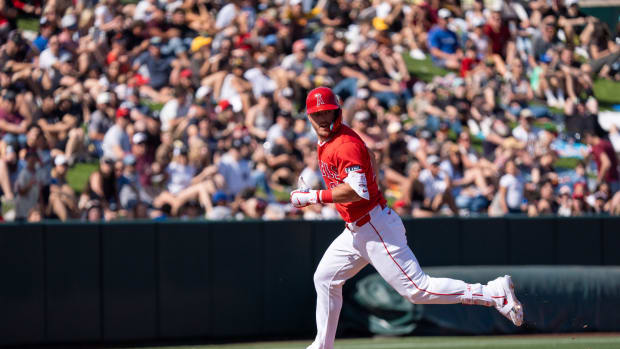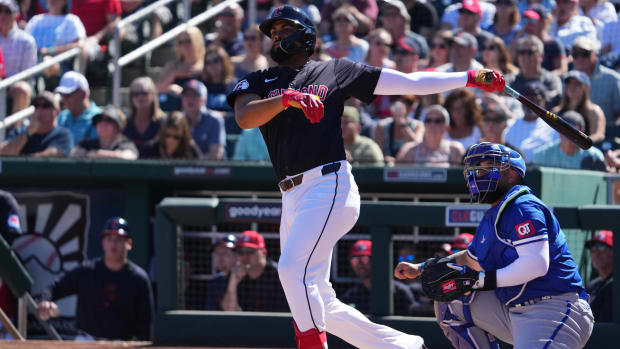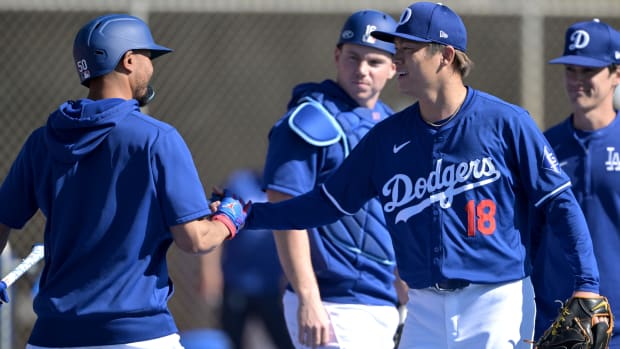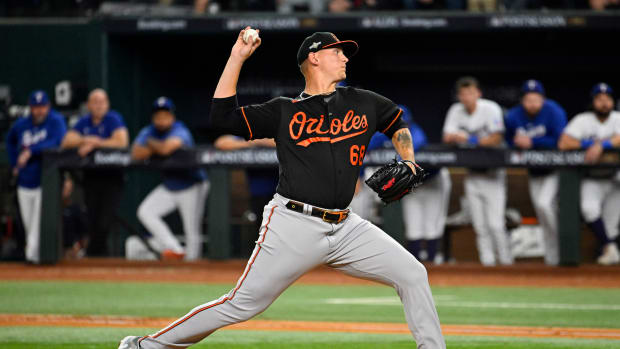Kershaw exorcises seventh-inning demons in Dodgers' Game 4 win
NEW YORK — The gap between the top and the bottom of the seventh inning at Citi Field probably seems unnecessarily long to most visiting pitchers. To Clayton Kershaw, during Game 4 of the NLDS on Tuesday night, it must have seemed interminable.
First, there is “God Bless America,” performed on Tuesday by a New York City firefighter named Frank Pizarro. Then there is “Take Me Out to the Ballgame,” during which Mr. and Mrs. Met show off their slow, top-heavy dance moves in rightfield. Two musical traditions satisfied; let’s get on with it.
Then, however, comes a third song, one that has been played at Mets games for a couple of decades, but relates neither to America or baseball, or anything pertinent whatsoever: the Italian-themed, mildly lewd novelty number “Lazy Mary,” by Lou Monte. The mated Mets mascots had time to throw what seemed like a couple of hundred T-shirts into the crowd.
• MORE MLB: Full postseason schedule, start times, TV listings
The 27-year-old Kershaw, meanwhile, spaced out his warmup pitches as best as he could. Though he emerged from the Dodgers’ dugout during the second song, he had thrown only six by the third’s closing notes. For one thing, he had to conserve his arm; he was working on three days' rest. And he had to be at his absolute sharpest, given what had happened to him in the seventh inning of his past three playoff outings, assuming this particular seventh-inning stretch ever ended.
The seventh inning doomed the three-time Cy Young award winner twice last October. He gave up seven earned runs in that frame in Game 1 of the NLDS against the Cardinals, and three more in the seventh in Game 4, and lost both. Then, in Game 1 of this series against the Mets, his command deserted him in the very same inning. He walked the bases loaded and ended up with another defeat, his sixth, in nine playoff starts, against only one win.
• MORE MLB: Cubs finish off Cardinals in historic NLDS clincher
On Tuesday, once the Mets’ nightly mid-game jukebox musical was over, Kershaw began the seventh at 86 pitches and protecting a 3–1 lead. An RBI single by Adrian Gonzalez and a two-run double by former Met Justin Turner, both in the third against Mets starter Steven Matz, had accounted for the Dodgers’ scoring. A Daniel Murphy solo shot had given the Mets their lone run in the fourth.
#http://www.120sports.com/video/v154381494/kershaw-silences-the-mets
With his second pitch to Yoenis Cespedes, leading off the seventh, Kershaw threw a looping, 74-mph curveball. Cespedes swung over it and tapped it down the third base line. Kershaw sprinted to field it and reached down, and the ball promptly ricocheted off his glove. Cespedes was safe at first, without a throw. “It’s like, ‘Oh, here we go,’” admitted Dodgers manager Don Mattingly, of the déjà vu that had entered his head. Even though Kershaw would never admit it, thoughts of seventh innings past had to have permeated his, too.
Three Strikes: Unheralded starters get ball on ALDS elimination day
Then, Kershaw transformed: from Clayton Kershaw, modestly and probably coincidentally struggling pitcher over a very small sample size, to Clayton Kershaw, best pitcher of not only his generation, but also of many. He got Travis d’Arnaud to pop out in foul territory. He got Lucas Duda to hit a first-pitch fly ball that carried, but only to the warning track. He got Wilmer Flores to hit a sharp grounder down the third base line, which Turner backhanded rather easily. The seventh was over, Cespedes never advanced past first, that 3–1 lead held until game’s end, and the Dodgers and Mets were on their way back to Los Angeles with the series tied at two. A single, decisive Game 5, to be played on Thursday night, was all that remained.
“When you have three terrific pitches and you’re throwing them all for strikes in any count and you’re confident with those three pitches, it’s going to be a long night for hitters,” said Mets third baseman David Wright. Kershaw’s final line reflected that long night for New York: Over his seven innings, he allowed one run on three hits and one walk, with eight strikeouts.
What that line didn't show was that he had broken a personal hex, and Kershaw himself didn't acknowledge it after the game. You could, however, tell that it had been eating at him, by the way the normally composed ace snapped at any reporter who brought the topic up to him. “That’s really the first question I’m answering?” he said, when someone asked him about Cespedes’s 40-foot single. “I mean, yeah, it was frustrating to give up a hit like that. That’s all I got for you.”
Later, when another inquisitor asked about the importance of completing the seventh—something he’d done only once before in his 10 playoff starts—Kershaw went nearly silent. “I mean, there’s no curse or anything,” he mumbled. “Just gotta get through the seventh. So, I don’t know.”
Cubs shake 'lovable losers' tag, beat Cardinals in Game 4 for NLDS win
Kershaw’s longtime catcher, A.J. Ellis, would betray the starter’s real feelings. “There’s no secret the seventh inning has kind of been a tough spot for him these past few postseason outings,” said Ellis, who visited the mound after Cespedes reached first. “There’s a flood of emotion that happens after Cespedes’s dribbler down the third base line. I was just trying to keep the positive thoughts in there. Negativity is going to creep in. ‘Here we go again.’ Keep him focused on the task. Talk about the next hitter, and how we’re going to attack him.”
Ellis would also confirm that Kershaw’s postgame stoniness amounted to a noble façade. “He definitely wanted this badly, and I’m so proud of him," he said. "I’m so proud of what he was able to do tonight, especially getting those last three outs, which were the toughest for him tonight. I’m just thankful and blessed that I was 60 feet away from him and got to be along for the ride.”
The Dodgers have ridden Kershaw to a Game 5 in which they will start Zack Greinke, who just finished a regular season in which he had the best ERA (1.66) for any starter in 20 years, and who will be working on normal rest. Greinke’s looming, long-haired presence would represent a clear advantage against most opposing starters, but not against the Mets’ equally talented, and even longer-haired, Jacob deGrom, who outdueled Kershaw in Game 1 by throwing seven scoreless innings.
• MORE MLB: MLB right to suspend Utley, but rule change needed
“As good as Zack is, and has been the whole year, deGrom has been the same,” Kershaw said. “So there’s really no home field advantage when you’re facing a guy like deGrom.”
“Anything can happen, honestly,” said Mattingly of Game 5, and that wasn’t just a manager’s platitude. For Kershaw, just two things were certain after Tuesday night. One was that his seventh inning curse was over, if it ever existed at all. The other was that he would not be hearing "Lazy Mary" again, at least this season.


































